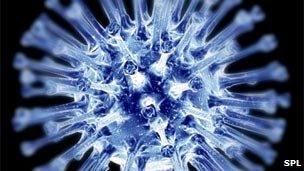Q&A: Seasonal flu risks and how to protect yourself
- Published

This year's vaccine protects against swine flu
What you should know about flu, the risks of catching it and how to protect yourself against seasonal flu.
Is this flu or swine flu?
Both. The dominant strain in this winter's flu is the swine flu virus from last year's pandemic.
The H1N1 strain (swine flu) is worse than other strains because it tends to develop more quickly and is characterised by high fevers and gastrointestinal upsets.
This winter's flu and swine flu have become the same thing - but this is still NOT an epidemic or a pandemic.
What are the symptoms of flu?
Flu symptoms include fever, headache, cough, sore throat and muscle aches. They appear quickly, last for about seven days and generally leave you exhausted for weeks afterwards.
It's different from the common cold, in which the symptoms tend to come on gradually and people recover fully after a week or so.
Flu can cause serious complications particularly in people with underlying health conditions, including pneumonia, and can even be fatal.
Why does it thrive in winter?
The flu virus is more likely to get passed from person to person in winter when people have a reduced immunity to illness if they are cold or unwell.
People are also more likely to congregate indoors in large numbers in hot, humid conditions during winter where the virus can thrive.
Can I avoid catching flu?
Short of isolating yourself from all people it is difficult to avoid encountering flu viruses. They are extremely common and are spread readily by coughs and sneezes. Read more about influenza on BBC Health.
To protect yourself and others this winter follow the Catch it, Bin it, Kill it advice - always carry tissues with you and use them to catch your cough or sneeze.
Bin the tissue, and to kill the germs, wash your hands with soap and water, or use a sanitiser gel. This is the best way to help slow the spread of flu.
Keeping your immune system strong by eating a healthy diet, taking regular exercise, getting enough rest and relaxation and not smoking will also help you avoid illness.
How can I protect myself against flu?
Every year scientists make a vaccine that will offer protection against the most commonly circulating types of flu.
This year's vaccine, external also protects against the H1N1 swine flu virus. The other two strains of flu this year's jab protects against are H3N2 and influenza B.
H1N1 is no different from other strains of flu as regards the principles of creating a vaccine to protect against it. Its inclusion in this year's seasonal flu vaccine poses no additional risk. It is included simply because it is one of the major flu strains circulating in Britain this winter.
David Cameron has now announced that stocks of swine flu vaccines from 2009 can be used to protect people against this winter's flu, after GPs in some parts of the country said they were running out of jabs.
The old vaccine is different from the jab being offered this year because it only offers protection against one strain of flu, namely swine flu, but as this is the dominant strain the government says it is the best option available.
How do I get vaccinated?

The vaccine protects against H1N1 and two other strains of flu
The seasonal flu vaccine is available free on the NHS to anyone in high-risk groups, such as people over 65 and those with chronic health conditions like diabetes (see high-risk groups below).
People in at-risk groups can get vaccinated at their local GPs.
This process has been complicated by the fact that some surgeries are running out, although GPs are saying they should be able to source some extra vaccine within a week or so.
If you are not in those at-risk groups the jab is NOT available on the NHS.
However it can be bought privately at pharmacies for between £7 and £12. Most pharmacies limit this service to people over the age of 16 or 18. Some employers also offer it to staff.
An anti-flu drug is also available for those who fall ill. GPs can prescribe Tamiflu to anyone they feel needs it, including children. While not a cure, Tamiflu can lessen the symptoms and shorten the duration of the infection.
Who is eligible for the free NHS vaccine?
People who are eligible are those in high-risk groups, external, which include:
Over 65s
Pregnant women
People of any age (including children) with long-standing health conditions including a serious heart or chest complaint or a previous stroke, serious kidney disease, asthma, diabetes
People with lowered immunity due to disease or treatment such as steroid medication or cancer therapy
Carers of an elderly or disabled person whose welfare may be at risk if they fall ill
Your GP may advise you to have a flu jab if you have serious liver disease, multiple sclerosis or some other diseases of the nervous system.
The Department of Health decided that healthy children under under five years old would NOT be offered the vaccine this winter.
If you think you may need a flu vaccination, check with your GP, practice nurse or your local pharmacist.
How does the vaccine work?
About seven to ten days after vaccination, your body makes antibodies that help to protect you against any similar viruses that may infect you. This protection lasts for about a year.
However the 2009 pandemic swine flu vaccine should offer protection for two years at least.
If you had that vaccine it is still recommended that you have the seasonal flu vaccine to give you full protection against the flu viruses that are circulating this year.
How effective is the vaccine?
Flu vaccinations are 70-80% effective in healthy adults, in years when there is a good match between the vaccine and the strains of flu in circulation.
The key is predicting the strains which are likely to circulate, then matching the vaccine to those strains. This winter's vaccine protects against H1N1 swine flu virus, H3N2 and influenza B.
Most people who have been vaccinated don't get the kinds of flu from which the vaccine was made.
If you do catch flu it is likely to be milder than if you had not been vaccinated.
Are there any side effects?
Flu vaccines have an excellent safety record with side effects being minor and usually disappearing within one to two days.
The vaccine is inactive and cannot cause the flu that it is protecting against.
However, some people can experience some side effects. They are usually limited to some soreness and swelling around the site of the injection, headache, fever, shivering and fatigue.
What about children?
What marks this winter flu out as different from previous years is the fact that younger age groups are bearing the brunt of the infections.
This is because the dominant strain circulating is the swine flu virus from last year's pandemic. This naturally has caused concern among parents worried about their young children.

Children under five with underlying health problems can have the vaccination
During the pandemic, healthy children under five years old were offered the vaccination, but this is not being done this winter as it is just being treated as a normal flu season.
Coupled with that, some pharmacies have refused to vaccinate children privately saying regulations do not allow them to. This has left many parents angry that their children are unprotected.
But there are two things that parents should bear in mind. Firstly, the majority of the children who get seriously ill are those with underlying health problems like asthma or diabetes - and this group CAN get vaccinated.
Secondly, the swine flu vaccine from 2009 should offer some protection. It was designed to last a couple of years at least. But the problem is that very few parents came forward last year with their children.
Just one in four children under five ended up getting immunised.
What about babies?
The vaccine is only for children aged six months and older.
All pregnant women at any stage of pregnancy are recommended to have the seasonal flu jab this winter, which will protect the unborn child and mother for around one year.
The flu vaccine is safe to have at any stage of pregnancy or while breastfeeding.
Is there an egg-free flu vaccine?
The seasonal flu vaccine contains different types of flu virus, which are grown in hens' eggs.
They are then inactivated (killed) and purified before being made into the vaccine.
Although there was an egg-free swine flu vaccination last year, there is NO egg-free vaccine for this winter's flu.
The advice is to go and see your GP.
What should I do if I think I have caught flu?
Most people will get better after a few days of rest and will not need to see their doctor.
The general advice is to keep warm, drink plenty of water to avoid dehydration and take paracetamol or anti-inflammatory medicines such as ibuprofen to lower a high temperature and relieve aches.
Staying at home will also help avoid spreading the infection to others.
People in high-risk groups or anyone who is concerned or very ill with the flu should consult their GP. Always contact your doctor if you're not getting better after a few days, if you're unduly short of breath or if you're coughing up blood or large amounts of yellow or green phlegm.
Anti-viral medication is available for some people who develop some types of flu but it needs to be taken early on in the disease to stop the virus multiplying, and may only reduce the symptoms rather than treating the infection.
In some severe cases hospital treatment may be necessary.